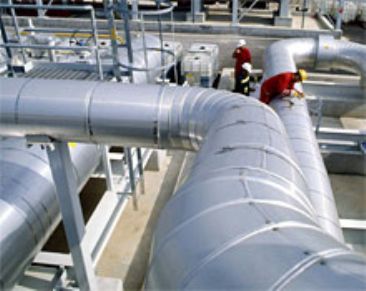
Massive Funding In Prospect For Nabucco Pipeline Construction
Publication: Eurasia Daily Monitor Volume: 7 Issue: 164
By:

On September 7 in Brussels, three leading international financial institutions launched the process of funding the Nabucco gas pipeline project, potentially to a multi-billion Euro level. The European Investment Bank (EIB), the European Bank for Reconstruction and Development (EBRD), and the World Bank’s International Finance Corporation (IFC) signed a “mandate letter that formalizes the conditions under which the three institutions will conduct their appraisals of the Nabucco project, and provides an indication of the potential level of financing” (joint press release, September 7).
The three institutions are prepared to provide up to 4 billion Euros toward funding the Nabucco pipeline’s construction, from eastern Turkey to Austria. Of that sum, the EIB would provide up to 2 billion Euros; the EBRD, up to 1.2 billion Euros (including up to 600 million Euros on EBRD’s account and up to 600 million Euros to be syndicated to commercial banks); and the IFC, up to 800 million Euros (including up to 400 million Euros on IFC’s account and up to 400 million Euros to be syndicated to commercial banks).
According to the joint announcement, this move constitutes “a clear signal that Nabucco has the full political support of Europe.” The three institutions are initiating a due diligence process to assess the project’s conformity with their economic, social, and environmental criteria for lending. The definitive funding decision would follow a successful conclusion of due diligence. The process is expected to be finalized in the second half of 2011. This would enable construction work to be launched in 2012, synchronized with the availability of gas supplies.
The project’s cost is estimated at 8 billion Euros. Thus, the three financial institutions are prepared to provide up to 50 percent of the cost. Shareholders in the Nabucco consortium had from the outset agreed among them to cover 30 percent of the construction costs (Dow Jones, September 7).
According to the project company’s (Nabucco Gas Pipeline International) managing director, Reinhard Mitschek, the company will in the next few months launch an “open season” process for gas shippers to book capacity in the planned pipeline. The line is planned to carry 31 billion cubic meters (bcm) of gas annually in its second phase. A test-run of the open season in 2008 had shown gas shippers’ total demand for booking capacity exceeding the planned capacity by some 50 percent. Strong demand for booking capacity can again be expected, as European import demand rebounds with the recovery from crisis.
The preliminary decision for project financing on this scale (with a final decision likely next year) marks the most significant milestone for the Nabucco project since its inception. It provides that incontrovertible, long-expected boost to the project’s credibility with Caspian gas producers and European gas importers.
It also vindicates the decisions by governments and companies in Hungary and Bulgaria to prioritize the Nabucco project clearly over its rival, Gazprom’s South Stream. According to Hungarian MOL supply and trade chief, Sandor Fasimon, at the signing event in Brussels, “Nabucco is a core project for Central Europe since it will provide real gas, ensure real competition, and promote security of supply, in a part of Europe that still lags behind in the necessary infrastructure and diversification of resources” (MTI, September 8).
Meanwhile, Romanian President, Traian Basescu, has overruled the economics ministry and changed its leadership, which had started discussions on Romania’s accession to South Stream in response to Gazprom’s overtures. This appeared to be a case of departmental policy contradicting national policy. At the annual policy conference of Romanian diplomats from around the world in Bucharest, Basescu deprecated those who had “jumped aboard South Stream’s wagon,” and noted that Romania’s exclusive bet on Nabucco has helped maintain the project’s credibility during the difficult times that are now behind it (Agerpres, September 1).




